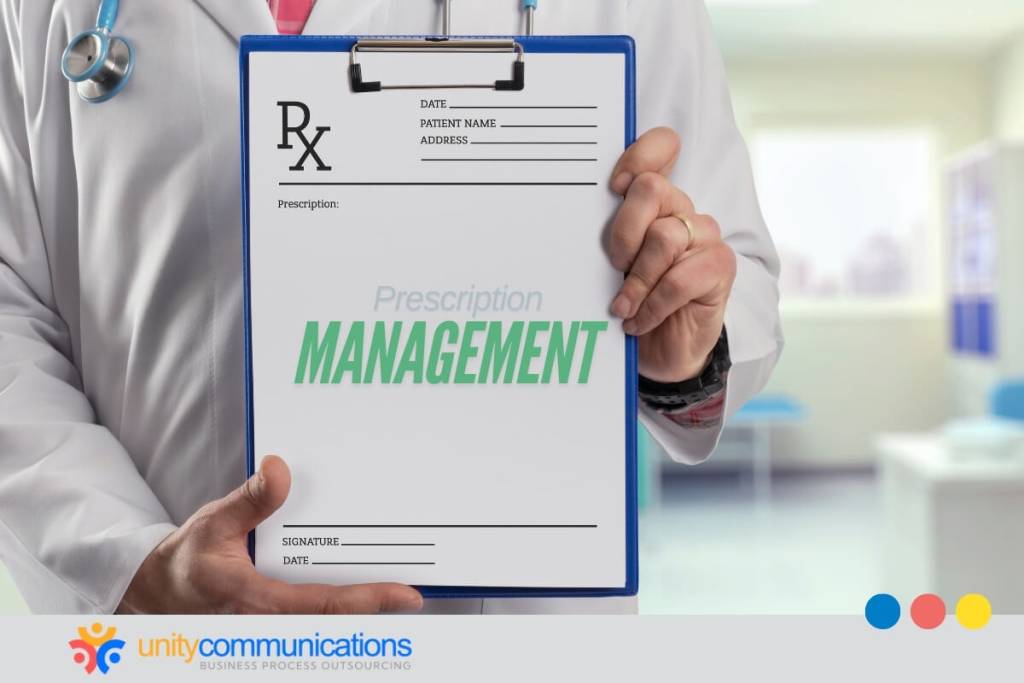IN THIS ARTICLE
Table of Contents
Effective prescription management ensures patients receive the correct medications on time, preventing errors and improving adherence. Healthcare providers can achieve streamlined workflows and better treatment outcomes by utilizing innovative solutions such as virtual medical assistant (VMA) support.
With virtual assistants handling prescription refills, healthcare organizations can enhance operational efficiency, boost patient satisfaction, and improve care quality. Read on to learn more about the impact of integrating VMAs in prescription management.
Why leverage virtual medical assistants to handle prescription refills

Virtual medical assistants offer specialized support to streamline healthcare processes. These professionals are best sourced through a business process outsourcing (BPO) company. What the BPO company does is recruit, train, and match expert VMAs with your organization to handle non-critical activities.
In prescription management, the BPO provider deploys skilled and experienced virtual assistants to effectively handle prescription refills. They work closely with physicians, nurses, and caregivers to elevate patient care.
VMAs improve the efficiency and reliability of this healthcare process in BPO in the following ways:
Automating refill requests
Timely prescription refills prevent medication gaps, which can lead to worsened health conditions or complications. For instance, a patient with diabetes needs consistent access to insulin to maintain stable blood sugar levels and avoid severe health issues.
BPO in telemedicine automates refill requests for improved prescription management. Virtual assistants handling routine processes such as prescription refills provide speed and accuracy.
VMAs manage the following tasks seamlessly for efficient prescription refills:
- Receive refill requests. Virtual assistants capture and log patient requests through phone, email, or online forms.
- Verify prescription details. They verify prescription details and patient information for accuracy through electronic health records (EHRs).
- Send requests to pharmacies. Virtual medical assistants use automated systems to forward approved refill requests directly to the patient’s pharmacy.
- Monitor refill status. VMAs track the status of refill requests and update patients on any changes or issues.
- Handle follow-ups. They manage follow-up communications for any additional information the pharmacy or patient requires.
- Follow up on approvals. Virtual medical assistants also monitor and follow up on pending approvals from healthcare providers for timely processing.
- Manage medication history. VMAs review and update patients’ medication histories for accurate record-keeping. They also inform healthcare providers of changes or potential issues.
- Coordinate with insurance providers. They communicate with insurance companies to verify coverage and claims related to prescription refills and resolve issues that might delay medication access.
By streamlining and automating these tasks, virtual assistants reduce administrative burdens on healthcare providers and enhance prescription management’s efficiency and reliability. This approach improves patient experiences and allows medical teams to focus on critical activities, such as patient consultations and treatments.
Enhancing patient communication
Clear communication during prescription refills teaches patients how to take the medications, recognize and report adverse reactions promptly, and prevent further health issues.
Virtual assistants significantly improve patient communication by providing timely and accurate prescription information. For example, a virtual assistant for a Phoenix healthcare organization informs patients about their medications and encourages them to engage with their treatment plans for better adherence and satisfaction.
When outsourcing administrative tasks in healthcare, VMAs use the following strategies to improve patient communication:
- Send refill reminders. Virtual assistants proactively remind patients when to refill their prescriptions, reducing the risk of missed doses.
- Provide prescription status updates. To keep patients informed, they offer real-time updates on the prescription’s status, including the approval and processing stages.
- Answer patient inquiries. Virtual assistants answer patient inquiries about their prescriptions and treatments via phone, chat, or other channels.
- Manage communication channels. They utilize various communication channels to ensure patients receive consistent, clear prescription information.
- Facilitate patient engagement. Maintaining communication enhances patient engagement and adherence to prescribed treatments.
- Assist with prescription transfers. Virtual assistants help patients transfer prescriptions between pharmacies for continuity of care and convenience.
- Handle refill authorizations. They facilitate the authorization process for prescription refills by coordinating with healthcare providers and pharmacies, streamlining the overall refill process.
Understanding how outsourcing works can help the healthcare industry leverage remote professionals properly, as outsourcing firms often train VMAs in customer service. With virtual assistants handling prescription refills and inquiries, medical practices can anticipate more effective communication and better patient outcomes.
Minimizing errors and adhering to regulations
Reducing errors in prescription refills prevents dangerous drug interactions and incorrect dosages, which can lead to serious health risks. Regulations control how medical teams dispense medications. For example, they might require authorization from licensed healthcare providers to protect patients and maintain compliance with legal standards.
Additionally, many jurisdictions mandate that prescriptions for controlled substances be refilled within specific legal limits to prevent misuse and guarantee patient safety. With virtual assistants handling prescription refills, providers can enhance compliance with these regulations and significantly reduce errors.
Here’s how they do it:
- Maintain accurate records. Virtual assistants keep detailed and up-to-date records of patient prescriptions to decrease errors from outdated or incorrect information.
- Adhere to healthcare regulations. They ensure all prescription management processes comply with relevant healthcare regulations and standards.
- Automate checks and alerts. Virtual assistants use automation to perform regular checks, send alerts for discrepancies, and resolve issues promptly.
- Support precision in dosing. They help verify correct dosage information and alert healthcare providers or patients of potential errors.
- Monitor timing and patient-specific considerations. Virtual assistants track and manage prescription timings, considering individual patient needs and schedules to enhance medication adherence.
Precision and compliance are critical to delivering safe and effective patient care. Healthcare BPO services offering virtual assistant support play a crucial role in adhering to regulatory standards in prescription management.
Choosing the right virtual assistant is also essential for maintaining high accuracy and regulatory compliance standards. When VMAs possess the necessary capabilities, healthcare providers can significantly reduce errors and improve patient safety.
The bottom line

Healthcare virtual assistants offer substantial benefits. VMAs handling prescription refills can streamline administrative tasks, manage timely medications, and improve patient communication, enhancing patient care.
Healthcare practices should consider integrating virtual assistants to boost prescription management’s efficiency and effectiveness, leading to better patient outcomes and smoother operations. Let’s connect to find out how a VMA can streamline patient care in your organization.





